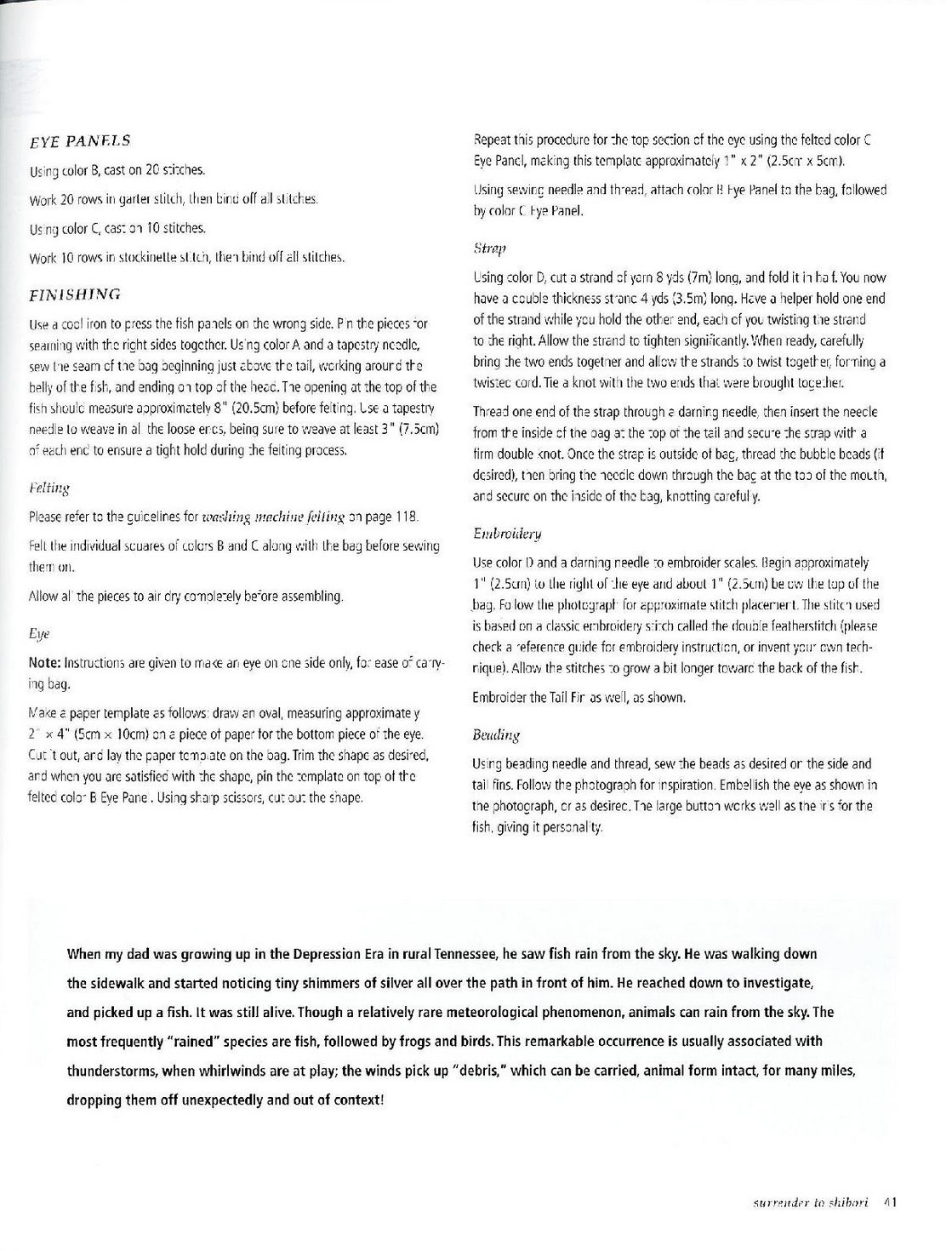85752 S20C 409120813230

EYE PAN ELS
Using color 3, cast on 20 scicches.
Work 20 rows in yarlei slilch, tłien Lir.u off a I tches.
Us ng color C, casc on 10 stitches.
Work 10 rows in slockinelle sl len, liun bind off cli stildies.
FINISH1NG
llse a cod bon to pross the fish paiels on che wrong side. P n the piccos _or seainhg with the richt sides together. Us ng color A and a tapestry nccdlc, spw l ie seon cf no oag oeginnina just ctcvc the taił, werking arourc the belly of the fsh, and ending o a top cf the hece. Tne opening at the top of the fish shuuic meesure aoproximetelv 8" (20.5cm) before fe t ng. Lse a tapestry need e to weave in al the loose eres, beinq surę to wsave at least 3" (7.5cm) nf eech enc to ensure a tight hołd duiing the feiting process.
Fetting
Pleasc- refer tc the ęuicelines for iwrfłing machin? feitbi# ca page 118.
-ell tlie indiv'idućjl scuaies oi cclcrs B and C ałuny willi tl e bag befoie sewing
tllPT OF).
Allow al the pieces to air ery como ecely bemre assembling.
L\/e
Notę: Instructions aie given to mace an eye on cne side only, for ease o1 ca ry-ing bag.
F/a<e a paper tenplate as follows: draw an oval, measurlng approximate y 2 x 4" (5cn x 10cm) co a piece ot papę' for the bottom piece o: the eye.
Cjc t out, arc lay the paper terno.ate on the oaq. Trim tho sloapc as desimd, ard when you arc sotisficc with :hc shapc, pin the tcmplatc or top of the feltcc colo' B Eye Pane. Using shop scissors, cj: oj: the snapc.
3epeat tois proceduro for :hc top section cf the eye using tnc fcltcd color C Eye Panel, making this tenplate approxinatciy 1" x 2" (2.5cr x 5crr).
Using sewirn needle and tłreari, aftach color H hye Panel tn the bag, fcllowed by color ( ł-y? Panel.
Strap
Lsing color D, cut a strand cf yorn 8 yds (7m) łona, and fold it in ha f. You now have a ccuole thickness sfonc 4 yds ;3.5mJ lonq. Hc\'e a nelper hołd one end of the strand while ycu hołd the other end, each cf you twisting tne strand to che right. Allow the strand tc tighten signricantly.When ready, careftlly bring che two ends togetner and allow the stiands co twist together, forming a twiscec cord.Tie a knot with tlie two ends thal were brought tocechei.
Thread one end of the strap through c darnirg needle, then insert the neecle frorr the inside cf tne oag a: the :op ot che taił 3nd securn che scrap with a firm double cnot. Once the strap is outsidc ot bac, thread che bubfclc bcads Cf desired), tnen oring tnc neecle down through the bac at the tcc of the motta, ard sccurc on the inside of the bag, knotting coreful y.
Embroiikru
Use color I) and a darning rpedle co embroider scales. Hegh aoproximately 1" (2.5uu) to tlie riylit of che eye and abotl I" (2.Serii) be ow Il e lup of the bag. Fu Iow tlie pliolograpf for app.nwirnats stitdi placener t. Tlie stiten use:i is based on a dassic enbroidery scicch called the double fealherstitch (f)lease cherk a mferenre guide for e mbroidery instructron, or inv?nt ymr own tpch-rique). Allow tb? stitches co grow a bit longer towarc the bark of the fish.
Embroider the Taił Fir os we I, os shown.
Beuding
Us rg beading needle and thread, sew che beads as desired or the side and tai fins. Follow tba phctograoh for rspiration. Embel ish the eye as shown in tne photocraph, cr as desirec. Tne large butten werks well as tne r s *or the fish. giving it perscnalty.
When my dad was grawing up in the Depressian Era in rural Tennessee, he saw fish rain from the sky. He was walking down the sidewalk and started noticing tiny shimmers of $ilver all over the path in front of him. He reached down to investigate, and picked up a fish. It was still alive. Though a relatively rare meteorological phenomenon, animals can rain from the sky. The most frequently "rained" species are fish, followed by frogs and birds.This remarkable occurrence is usually associated with thunderstorms, when whirlwinds are at play; the winds pick up "debris," which can be carried, animal form intact, for many miles, dropping them off unexpectedly and out of context!
nurrsiidpr ta ?kibori f\ 1
Wyszukiwarka
Podobne podstrony:
S20C 409120813320 shibori fez The Shibori Fez represents one of myfirsl Irue success stones in thepr
Sewn-on Facings Work ribbing to the desired length, then work 2 morę rows in a contrast color.
S20C 409120813261 kuffle Using color B and wilh Ił e riyhl side fscing, pick up and knit 1 stitcn in
S20C 409120813410 Work G ows in stockhette stitch. With color E, work 4 rows in stocsinelle srrch.
S20C 409120813411 s iI vous plait kimono conlinued riown One W th color 3 ard smaliest neeules. pick
S20C 409120813292 Bind off the next 8 st tchos. Work an -córci W* (11 .Sm ) iong using the nex: 3 s:
więcej podobnych podstron